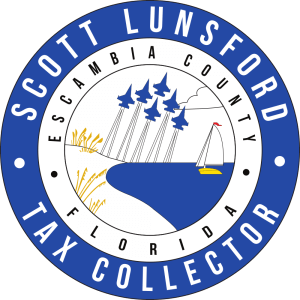WHEN DO REAL ESTATE TAXES BECOME DELINQUENT?
Real estate taxes become delinquent on April 1 each year. Example: 2020 taxes become delinquent on April 1, 2021. At that time, a 3% charge is added to the gross amount.
ARE DELINQUENT TAXES ADVERTISED?
Yes. A list of all real property with delinquent taxes is advertised once a week for three consecutive weeks in a local newspaper. The advertisement specifies the place, date, and time of the Tax Certificate Sale.
WHAT IS A TAX CERTIFICATE?
A tax certificate represents a first lien on real property and bears interest at a maximum rate of 18% per year. The cost to purchase a certificate is listed beside each parcel in the delinquent advertisement and includes gross tax, interest, advertising cost, and the cost of the Tax Certificate Sale.
WHAT IS A TAX CERTIFICATE SALE?
On the advertised day and time, the tax collector auctions and sells a tax certificate on each delinquent parcel. Each item is bid individually, and the certificate is sold to the person bidding the lowest interest rate. Bidding is by electronic input and begins at 18%. Since taxes on some parcels will have been paid prior to the sale, those paid parcels that appeared in the newspaper will be skipped.
WHAT IF THERE ARE NO BIDDERS?
If there are no bidders for a certificate, it is issued to the County at 18% interest. Tax certificates representing less than $250 in delinquent taxes on a property with a homestead exemption are issued to the County at 18% interest per Florida Statute 197.432(4) and cannot be purchased.
HOW ARE TAX CERTIFICATES REDEEMED?
In order to clear the property of the tax certificate lien, the property owner must pay the tax collector’s office the amount of the tax certificate plus the rate of interest at which the certificate was sold, calculated from the month of the sale to the month of redemption. When a tax certificate is redeemed, a $6.25 redemption fee is also charged and collected by the tax collector’s office. Buyers are refunded by ACH following the redemption(s). Please note that interest earned is taxable and must be reported to the IRS. Each January, a Federal Form 1099‑INT is sent to each certificate holder for earnings in the previous year.
WHAT IF THE CERTIFICATE IS NOT REDEEMED?
If the certificate is not redeemed within two years from the date the tax became delinquent, the certificate holder may apply for a tax deed and force the land to be sold at a public auction. Example: 2020 taxes become delinquent April 1, 2021; therefore, a tax deed application may be made after April 1, 2023. A certificate holder who wishes to apply for a tax deed must redeem all other certificates and pay other fees as mandated by state law.
WHAT HAPPENS AT THE LAND SALE?
If the land goes to public sale, the starting bid is the total amount of the tax deed application. When the property is assessed on the latest tax roll as homestead property, the starting bid also includes one-half of the assessed value of the property as listed on the current year’s tax roll.
The highest bidder will receive a tax deed from the Clerk of the Circuit Court. This is not the same as a warranty deed, as more steps may be necessary to obtain a clear title. If the applicant is not the highest bidder, he/she will be reimbursed for the total amount paid at the time of the application plus 1.5% simple interest per month from the first day of the month following application through the date of sale.
CAN A PROPERTY OWNER STOP A LAND SALE?
Yes. The owner of the property can prevent the loss of the land by paying all accrued costs and interest at any time before the tax deed sale is held.
WHAT IS THE LIFE OF A TAX CERTIFICATE?
The life of a tax certificate is seven years from the date of issuance. If the certificate holder does not apply for a tax deed within the seven years, the certificate is null and void.
IS THIS A RISK-FREE INVESTMENT?
No. Although a secure investment in most cases, as with any investment, there is an element of risk. Some possible risks to consider are:
- If there is a correction to the original taxes levied that would decrease the certificate value or cancel the certificate, the law provides for the portion in error to be refunded to the certificate holder with 8% interest or rate of interest bid, whichever is less, per annum calculated monthly to the date of cancellation or correction.
- If the property value drops significantly in subsequent tax years, it may cost more to bring the property to a sale than the value gained by owning the property (e.g. parcel may have an assessed structure that subsequently is burned down or condemned and destroyed).
- If the landowner enters into bankruptcy, the certificate holder is prevented from enforcing the lien until the bankruptcy is released. In one instance, the bankruptcy court lowered the interest rate and ordered payments to be made over a five-year period.
ARE THE COUNTY’S CERTIFICATES AVAILABLE FOR PURCHASE?
Yes. County-held certificates are available for purchase online at Lienhub.com. When a county certificate is purchased, the lien is transferred to the buyer. The purchase price is the amount of the original certificate plus interest due to the date of purchase, plus a $6.25 administrative fee. The interest rate of the purchased certificate is 18%.
HOW DO I BECOME A BIDDER?
Bidders must register at Lien Hub. A registration form must be completed electronically for each bidder with name, address, phone number, and taxpayer identification or Social Security number.

